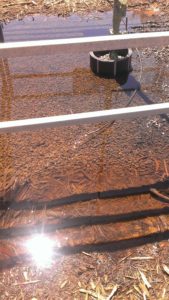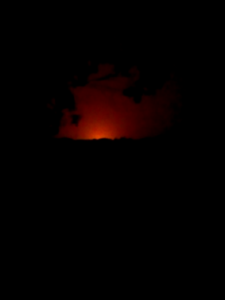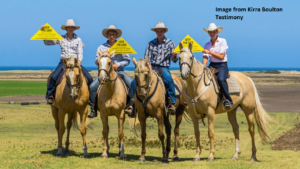Session 4 – Government Subsidised Pursuit of Fossil Fuels
The public participation case will examine the lack of opportunities for, and sometimes obstruction of, public participation in decision-making about fracking
View and download a PDF version of this PowerPoint presentation here. [1MB]
People for the Plains – Narrabri Testimony
Simone Marsh Testimony
Witness of official misconduct / misfeasance of legislated approvals processIn the period February-June 2010, whilst professionally contracted to undertake environmental impact assessment report writing work (on behalf of Queensland’s Coordinator-General) for the world’s first upstream coal seam gas (CSG) to liquefied natural gas (LNG) export projects, I witnessed (and was unwittingly used in) an unspeakable crime against the environment and people of Australia. As a result of an unlawful approvals process, human rights are being violated.In 2010, section 310D of the Environmental Protection Act 1994 (Qld) required detail of: ‘environmental values’ likely to be affected (i.e. baseline environmental data); ‘all relevant activities’; land on which all relevant activities are to be carried out; and ‘potential adverse’ impacts – to be described in an environmental management plan (a component of the proponent’s Environmental Impact Statement).However, the Coordinator-General Evaluation Reports, for the Santos GLNG project (May 2010) and the BG Group / QGC QCLNG project (June 2010), attempted to override requirements of environmental laws. The conditions proposed that gas field environmental values and impact details could be provided after the assessment process ended. Conditions include the line: “to be submitted to the Coordinator-General for review prior to the commencement of petroleum activities in the gas fields.” The detailed maps could effectively be submitted the day before the equipment turned up on site.For further details on missing information, missing limits and disregard for State and Commonwealth laws and international obligations, please refer to the attached Senate documents.In early 2013, after attempts (over the course of several years) to raise the matters failed, and whilst undergoing medical treatment (for adjustment disorder, trauma, chronic anxiety and depression), I became a whistleblower on the ABC Four Corners program ‘Gas Leak’. I provided evidence to the State’s crime watchdog, the Crime and Misconduct Commission (CMC), for assessment in 2013. A public (unsigned) media release on the watchdog’s web page contradicts key evidence, and no signed report was released. Attempts to obtain the report, including under ‘Right to Information’ laws, have failed.I also provided evidence to various federal Senate Select Committees (between 2014-2017). I was forced to sell my home during this period, after drawing upon savings while unable to work in my profession. Evidence was withheld by the 2014 Senate Committee (which included conflicted Senators); recommendations were ignored in 2015; subsequent Committees were prematurely cancelled due to an early election called by the Prime Minister in 2016; and evidence was not accepted by a re-formed Committee (that included a conflicted Senator) in 2017. Thus, there has been no resolution or closure of these matters.In recent weeks the Australian government has indicated (via a bill introduced to parliament) intention to impose criminal penalties upon whistleblowers and journalists who disclose government information. Penalties include imprisonment for up to 20 years. The bill lacked a public interest defence for government whistleblowers. The proposed penalties extend to journalists, academics and activists that receive such information.For further details, please refer to the attached Senate documents, and the following news articles:Thank you.
Tracey Anton Testimony
As a community and agricultural advocate for mining reform I have been working with many Victorian groups impacted by mining. I would like to submit my submission as evidence of non-compliance and breaches from unconventional gas mining in Gippsland Victoria.
Mel & Phil Mills Testimony
Daniel Tapp Testimony
My Name is Daniel Tapp and I would like the following to be my testimony to the tribunal. It is not possible to describe the number of hours taken from my business and family that I have dedicated to sifting fact from spin and trying to get our voices heard above the financially amplified voices of the industry. It is not possible to describe the fear and exhausted inevitability I have heard and seen in the faces of the people in the NT. I believe that this industry has a huge impact on the fundamental people’s right to clean air and water and the risks the government and industry are willing to take are being taken through the denial of the people’s right to participate in government through systematic preferential treatment to the industry and their lobbyists.
Gladstone Conservation Council Testimony
The testimony of a community group demonstrating the devastation caused by government making decisions in favour of the Gas Industry
Presentation
Landholders Ascert Testimony
In the space of about 5 years Landholders Ascert has attempted to assist approximately 30 landholders in the process of managing their interactions with the Industry through providing day to day communications support and including advocating on their behalf with the industry and government over compliance issues. In order to demonstrate the difficulties individuals have when it comes to ‘coexisting’ and participating with the government and industry I have attached a de-identified example of just one such interaction involving what the landholder believed to be a contamination incident.
It has become clear to me that there is massive inequity between the levels of access and participation available to individuals expected to host this industry in their homes and the method of dealing with the reality of that experience by the government and the industry.
- Many of the individuals may indeed have more than one gas company access agreement on their property.
- the responsibility is on the individual to prove the impact and pursue restitution
- the government has a cosy relationship with the industry and there is virtually no independent investigation of complaints or data gathering, the government departments rely on the industry to do the leg work.
- most individuals do not have the time or the expertise to interpret and reply or rebut government and industry speak and as a result any interaction is whittled down by exhaustion and confusion caused attrition.
- the government have a conflict of interest in protecting industry data and information from the public through the right to information process which is time consuming, expensive and very difficult for the average person to navigate
- The government’s default position is deference to the industry to respond to complaints, incidents and compliance issues, a reluctance to prosecute, and at least tacit support if not overt support of the industry position and negation and belittling, deflection and palming off of individual concerns.

Shay Dougall Testimony
My name is Shay Dougall and I would like to use four items as testimony my to the way in which the public are prevented from participating in decision making and the impact of ‘coexistance’. I believe it also demonstrates the poor position that the public are in to protect their health and safety from and industry and government who are at the very least, uninterested in the collateral damage their decisions cause.
- The first is a statement I made to the Right to Say No Senate Inquiry Committee public forum and the submission i made to the Certain Aspects Inquiry.
2. And the second is an interaction with the industry and government over a complaint i made in relation to disturbance from the Orana Flare at my residence some 3-4 km away.
My complaint on official complaint paperwork read as below, and the response from the government is attached followed by my response. Note the total lack of engagement with me over the ‘investigation’ by the government, also note the default position of defending the industry, and the industry provided data is the only source of investigation.

View from kids bedroom of Orana Flare
October 2014 – I have been experiencing light and noise and Fume/ smoke environmental nusiance from the Orana GPF. We have been intermittently experiencing rumbling like thunder within the house and in the yard, during the day and night, as well as light flickering like a camera flash visible from the western rooms of the house (Children’s bedrooms) and in the yard and front verandah at night
It affects the peaceful enjoyment and amenity of our home as it disturbs the natural night by causing an unnatural glow over the night, the rumbling effects us as an on going background noise that intermittently becomes an obvious noise that disturbs the normal noises experienced in a home. It is beginning to feel like hearing a train that never arrives. I am worried that the fume/smoke is carrying pollution that will be in my drinking water
At no time has the company undertaken any consultation that involved me regarding the impact of this facility on my home.
Up until recently this was a quiet farming community where the loudest noise may be a tractor harvesting for a short period of time in the year, and the brightest light at night was the milky way.
it is unreasonable and unacceptable to have a company undertake such significant impact on a community with no consultation and no control. This is a significant and negative effect on the community that should be reversed.
EHP Response
My response to their report above
3. And the third is my experience with underground coal gasification: I took these readings on my front verandah with a private $5000 gas detector purchased explicitly for the purpose of citizen science, during a particularly powerful bout of “Linc Stink”. The following is my testimony as to my experience living with the impact of this industry. (image shows a PID result of 4.4 ppm of VOC)

4. The fourth is the outline of emails and reports provided to the government in an attempt to get an answer regarding the precautionary principle being applied to allowing CSG exctraction in an area already impacted by an evolving unconventional gas contamination incident (re Linc Energy). The bottom line is a risk assessment was requested, but none was made available. It also indicates the level of concern the community had that was ignored by the industry and the government.
Government response to one of the emails
Documents from EDO and Government about the CSG Activities and the Linc Contamination
David McCabe Testimony
Lock the Gate Alliance Testimony
Lock the Gate Alliance is an alliance of large numbers of individuals and communities from across Australia who are concerned about the impacts of unconventional gas on human rights and the environment.We have previously made extensive submissions to a large number of government processes on the issue.
We have attached three submissions which summarise a large number of impacts that we have observed over the last 8 years, including impacts which clearly impede on human rights, including:
- The right to a safe, healthy and sustainable environment
- The right to health
- Family’s right to protection
- The right to water, food, property, privacy
- The right to know and the right to information
- The right to your culture
- The right to participate in the decisions of the government.
- The right to remedy, redress and mitigation
- The right to free, prior and informed consent
- The right to the protection of the law
Boultons from Seaspray Vic Testimony
Kirra Boutlon Testimony

Kerrin Schelfhout Testimony
Seaspray Community Testimony

DDEC Testimony
The Darling Downs is located in the State of Queensland, Australia, and covers around 80,000 square kilometres of world renowned prime agricultural land, featuring deep black vertisol and red volcanic soils and an average annual rainfall of between 580mm and 850mm. It is located 132km west of Brisbane and Toowoomba is its principal city.
The Darling Downs Environment Council, or DDEC, is an incorporated association affiliated with the Queensland Conservation Council and is dedicated to protecting and preserving the environment in our region. Our principal role is to support the objectives of local incorporated and unincorporated member associations protecting different aspects of the environment. Two of our affiliates, the Oakey Coal Action Alliance, OCAA, and the Western Downs Alliance, WDA, are directly concerned with the effects of mining and gas mining, and we have assisted and made representations on their behalf.
It is also pertinent to note that under Queensland Mining law – gas and other miners have ultimate rights of access to leasehold and freehold land, enforceable by the Mineral Resources Act 1989 and the Land Court. Landholders and residents rights to a healthy and safe environment are principally regulated by the Department of the Environment. It is to this authority that complaints are made about infringements of these rights, and the department is also responsible for monitoring of compliance of the conditions of Environmental Authorities (EAs) which authorise the circumstances under which environmental harm may occur.
One of the key principles which must be honoured under Environmental legislation is that of inter generational equity, that is to ensure that future generations are not permanently deprived of the use of land and waters by extractive industries, or at the very least, that mining activities provide other benefits which outweigh future losses.
It is in relation to the principle of intergenerational equity, protection of the environment and the harm caused by the mining industry to the physical and psychological well-being of citizens that DDEC has come across deficiencies in the system.
These deficiencies relate to two main concerns. Firstly, the paucity of monitoring, monitoring data and access to it and secondly, the inadequacy of conditions set by the Department of the Environment coupled with the Department’s poor record of enforcing of those conditions.
We make this submission to the Permanent Peoples’ Tribunal Session on the Human Rights Impacts of Fracking as part of session 4, Government Subsidised Pursuit of Fossil Fuels, as in effect the asserted lack and deficiency of regulation provides, in our view, a free pass to gas miners and others to repudiate their moral and legal responsibilities associated with their social licence to mine.
The Royal Society of Queensland was inaugurated in January 1884. It was born out of the Philosophical Society of Queensland, founded in 1859, the year Queensland was proclaimed a separate colony. It is affiliated to the Royal Society of London and is considered the premier source of peer reviewed original scientific research in the State.
A recent Royal Society paper from 2017 by D. Marlow entitled “Community Empowerment and cooperation in Environmental monitoring of extractive sites: paths to a state-wide integrated system” highlighted many of the issues faced in the execution of the regulatory mandate of the Department of the Environment. It notes “In Queensland and elsewhere, there is a paucity of environmental data on abandoned extractive sites, and the public service agencies responsible for determining and monitoring the environmental conditions on these sites are inadequately resourced. There is also a paucity of publicly available environmental data on operational extractive sites (and little independent monitoring of these sites), and a lack of public trust in both the companies that conduct extractive operations and the government that oversees these operations.”
This observation mirrors the experience of DDEC and a copy of this paper is appended to this submission.
In November 2014 DDEC, at a face to face meeting of the Minister and the Environment Department, I asked the following question on behalf of Western Downs Alliance about monitoring and testing of CSG – “We are assured that this is a highly monitored and regulated industry yet anyone that wants the actual data of the monitoring or testing that has been done cannot access the data they need. Water use (both extraction and disposal) by the CSG industry seems to be largely self-regulated, poorly monitored and lacks transparency. Why? Will the Department publish or make available results from monitoring of the CSG Industry in Qld.”
I also asked “Is there a comprehensive plan to deal with the 450 000 tonnes (lowest estimate) of salt brine this industry currently produces per annum?”
These same questions were asked again in February 2015, August 2015, March 2016, November 2016, April 2017 and October 2017 at face to face meetings with the Ministers of the day and Departmental officials.
To date, despite reassurance that the answers would be available after each occasion, the only official responses we have received have directed me to the relevant legislation only, and not to the data. This, in our view, is an impediment to any individual or group seeking to protect themselves or the environment from harm. A copy of their initial reply to our questions is appended to this submission.
As Marlow noted in the Royal Society article “The environmental information relevant to decision-making on extractive sites is presently stored on multiple databases (some of which are multi-purpose databases), if it is stored at all. The value of the stored data is diminished, because it is difficult or impossible to assemble all the information required for optimal decision-making on any issue involving extractive sites.”
This observation reflects our experience. One solution is for community groups to gather their own information, however, beside the expense, the potential to do so is stymied by the need for cooperation with the extractive industry operators, and by a lack of any provision for private prosecutions for breaches of environmental regulation. A lack of information also mitigates the industry against any other protective actions citizens might take to protect their interests and health.
Lack of enforcement of regulation and monitoring has recently resulted in environmental destruction of an unprecedented but as yet undefined scale concerning the underground coal gasification programme authorised by the Department of the Environment for Linc Energy near the town of Chinchilla on the Darling Downs. We have attached an exhibit which highlights the current prosecution of Linc Energy which only occurred after gas contamination was detected to be an explosive level in the subsoils of the surrounding farmland and following the collapse of two Departmental inspectors sent to check ‘old smokey’ as one of the pumps on the project was nicknamed.
The current proceedings have highlighted negligent and possibly criminal practices extending over more than 7 years without intervention by the regulator, despite numerous complaints from adjoining landholders over that period. The regulator (The Environment Department) took no discernible action over that period. A rehabilitation deposit of 20 million dollars held as security has been estimated to only cover the cost of surveying the problem and conducting the prosecution. However, as the Company is now in liquidation this suggests that any rehabilitation, estimated in the hundreds of millions of dollars, will be at public expense, if it occurs at all. There is a lack of trust and confidence in the regulator by the Public and organisations such as ours to not repeat these errors or to take appropriate action against current environmental breaches. A head in the sand attitude by the Department Of Environment was noted by the Land Court in a recent hearing regarding expansion of a coal mine at Acland on the Darling Downs to which DDEC was a party and where the presiding Judge, Member Smith noted;
“Because no regular monitoring has been undertaken by NAC in or around the mine site, it is impossible to confirm whether EA air quality limits have or have not been
adhered to.”
It is important to remember that in Queensland, monitoring of conditions is principally left to the miners themselves. By keeping insufficient or inaccurate data, they protect themselves from prosecution, at least until it all goes horribly wrong, when of course, it is too late.
Judge Smith also concluded that the Environment Department (appearing as the statutory party in the case) had failed in its responsibilities, and was defensive about those failures being examined.
“The statutory party strongly resists any action by this Court to even look at its performance
in handling complaints made to it, let alone the adequacy or otherwise of its responses to
those complaints. The objectors on the other hand have provided the literal ‘truck load’ of
evidence and material detailing what they say to be unacceptable levels of noise generated
by NAC’s operation of Stages 1 and 2.
My independent, considered view on what I have before me is consistent with the
evidence given by the objectors that they have actually been treated very poorly by
both NAC and the statutory party……This demonstrates what I can only call the folly of the regime under the current EA.”
The methodology of complaint investigation on noise was also highlighted by the Judge
“An analogy to me is a person walking down say George Street in Brisbane on
Tuesday night being robbed and making a complaint to the police that night that he
was robbed, with the police attending George Street in the middle of the day, two
days later and noting that no robbery was taking place. That situation is, of course,
laughable, and I also would consider it absurd were it not for the fact, clear from the
evidence before me, that that is the way it seems complaints have been dealt with
under the current EA conditions.”
The deficiencies of the Environment Department have become apparent by their action, inaction, and their inability to do their job have, in our view, been demonstrated in the Linc and Acland Coal matters. Where the regulator has failed, as it has, the consequences for Landholders, people living in the gas mining districts, and the environment as well as the public of Queensland are dire, and will continue to be so until the regulator really regulates and acts in the best interests of the public and not the resource companies. A worrying example is the approval of fracking chemicals whose chemical composition are not published in order to protect the commercial rights of gas mining companies.
We have been informed by the Environment Department that it lacks the resources to properly police its own regulations. We do not accept this as a valid excuse. We have highlighted the extent to which the public is financially exposed, let alone the health and environmental costs, and conclude that this will result in expenditure in an order of magnitude far larger than that associated with proper regulation.
We concur with the conclusions of D. Marlow’s paper for the Royal Society
“Extractive industries alter the environment as a consequence of their operations. The air, the soil, surface water and ground water can be contaminated, and aquifers can be over-used
or depressurised. The extractive industries and the governments that approve and oversee their operations have a social obligation to reduce such environmental damage to a practicable
minimum. Environments potentially adversely affected by extractive sites need to be adequately
monitored, to identify and quantify any emerging environmental problems.”
It is the submission of DDEC that the evidence shows that in the Coal Seam Gas industry the preconditions to enforcing regulation and ensuring that the health of the environment and future generations do not currently exist in practice within the current regulatory framework in Queensland. Therefore, no positive case can be made for the social licence demanded by the Mining Industry, and that the precautionary principle should be applied until they do.
We have attached submissions made by ourselves and our members to State Government and Senate enquiries into fracking which cover our concerns in greater detail. We have also provided examples of requests for information from the Environment Department that have been refused and a submission to the UN Special Rapporteur on the situation of Human Rights defenders in QLD. We thank the Tribunal for its time.
